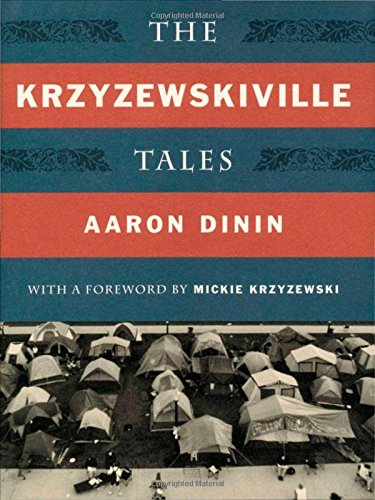Although the title may serve the purpose, Aaron Dinin’s The Krzyzewskiville Tales should sport a warning urging misguided Tarheel supporters to stay away. Echoing ESPNU’s “Never Graduate” slogan, and steeped in the unrelenting devotion only college students can display for their school’s team, twenty-two-year-old Dinin’s debut embraces two traditions: the storytelling of The Canterbury Tales and Duke University’s annual “tenting” ritual. For an explanation of the latter, here’s a quote from the barely ironic twenty-page glossary, “Crazie Talk”:
Tenting adj [tent n as in sense IC + -ing suff as in AHD 4 sense 2] describing a process involving the participation in Krzyzewskiville in order to be admitted into Cameron for basketball games. 2003, March 24, Chronicle: “A six- or seven-week long tenting season might have been a little too long this year.”
(For the uninitiated: K-ville is a “town” of tents outside Cameron Indoor Stadium populated by hard-core Blue Devil fans during the basketball season.)
This single entry encapsulates Dinin’s entire book and illustrates its core conflicts. He attempts to make the tenting process seem rational and sane while realizing on some level that it may be a little too… something. In fact, his need to tell tale after tale of K-ville life might be a little too something as well, but this drive is also the most compelling aspect of the book.
In unabashed homage to Chaucer, Dinin applies the storytelling-travelers setup. On the final night before the Carolina game, a reporter joins a group of twelve tenters (including one named “Aaron”) and convinces them to participate in a yarn-spinning contest in which all tales must involve K-ville.
The ensuing dodecameron varies in construction and content. The Freshman’s story explains the benefits of a system rewarding the most devoted students with the best seats; the Captain’s story recounts how K-ville began. The Math Major gives advice on how to train to be a Cameron Crazie; the Engineering Major regales the audience with an account of how an Engineering Major tricks a Sociology Major in order to sleep with the Sociology Major’s girlfriend (a “Miller’s Tale” nod).
Dinin’s writing reflects his youth. The tale weavers’ flatness is partly due to the fact that each is named and characterized by his college major. And since characters are constantly explaining the nuances of the tenting process, presumably for the reporter’s benefit, the dialogue can sound wooden.
That said, this is the most singularly driven book I’ve ever read. Every character, story, statement, and emotion is related to tenting. Sure, thanks to the premise, the stories have to relate to K-ville, and the reporter serves as a foil, but to retain and reiterate a single note of desire for more than 200 pages is astounding. By the fourth story, the book has taken on a swirling, obsessive quality, with “tenting in K-ville” as the mantra centering the characters’ lives.
In the grand Southern tradition, Dinin has taken a postage stamp of land and created a world, albeit one best appreciated by Duke alumni and ESPN reporters. As a hard-core Blue Devils fan, I respect the obsession—though these days I prefer to stay out of the rain and wait for the game to start in the comfort of my living room.
—Chad W. Post





